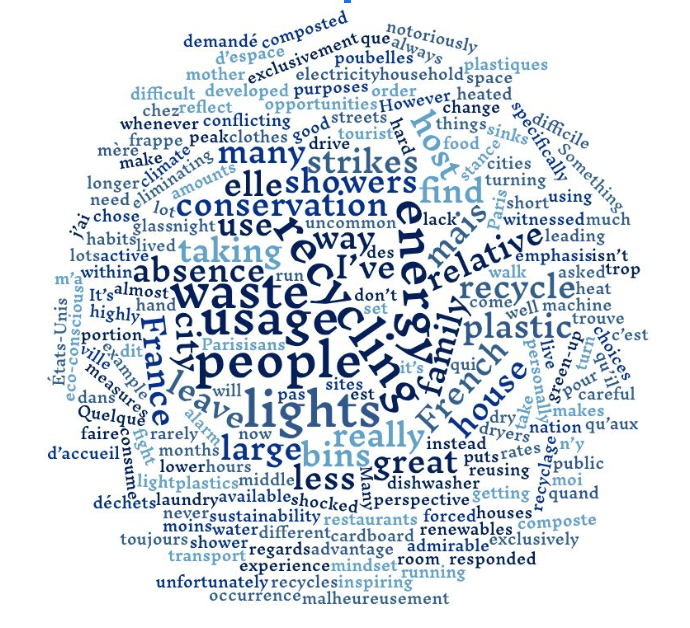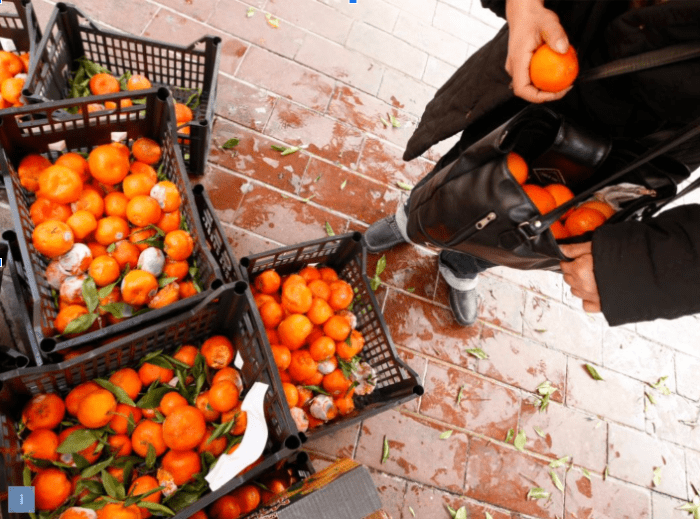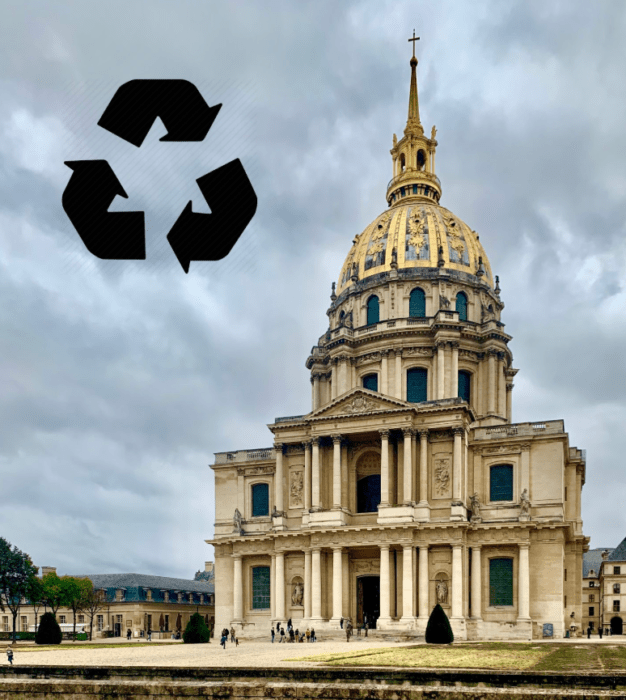Sustainability in Parisian Households Interviews

Wordcloud with words most frequently used in my interviews (in English!)
Rather than a more traditional long-form interview, I chose to conduct brief interviews with a variety of French inhabitants. Specifically, I spoke with twelve people ranging from full-time Parisian inhabitants to American students experiencing cultural immersion by living in French homestays. I thought it would be interesting to hear from a variety of perspectives in order to encapsulate the melting pot culture that comprises most major cities, Paris included. Below you can find excerpts from their thoughts on sustainability in France as well as cultural differences regarding sustainability in France vs. the US.
The major takeaway I had in terms of a cross-cultural comparison the different ways sustainability is ingrained into French vs. American society. In the USA, one is able to recycle with relative ease and even compost in many areas, whereas in France it is difficult to find recycling repositories outside the household and compost is even more uncommon. However, in France, energy conservation is taken much more seriously. Light switches go off the moment you exit a room and showers are kept extremely brief. Households typically don’t use a dryer and laundry loads are done far less frequently than the US. Of course, not every household operates in this manner and there are certainly households in the US that prioritize energy conservation or don’t recycle, but the interviewees I spoke with reflected upon these topics the most often.
“France is a great example of a highly developed nation leading the way in the fight against climate change, getting a large portion of its energy from renewables and taking active measures in its cities to green-up.” (MO)
Food Waste

Leftover clementines are available for a passersby to take (Image source)
A Reuters report finding French is most food sustainable country, U.S. and U.K. faltering was referenced by one individual I spoke with. Supermarkets are required by law to give leftover food to charities in addition to other sustainable measures such as an agroecology policy which incorporate crop rotations and limited chemical fertilizer use.
Recycling

Les Invalides in Paris (notice no public trashcans/recycling bins!)
- “Something that strikes me is the relative absence of waste bins exclusively for recycling but I find there is much less plastic waste at my house than in the US. (Quelque chose qui me frappe est la relative absence des poubelles exclusivement pour le recyclage mais je trouve qu’il y a moins de déchets plastiques chez moi qu’aux États-Unis”.) (AB)
- My host mother always recycles but when I asked her if she composted it, she responded that it’s too difficult to do in a city, unfortunately, there isn’t space. (Ma mère d’accueil recycle toujours, mais quand j’ai demandé si elle composte, elle m’a dit que c’est trop difficile à faire dans la ville, malheureusement, il n’y a pas d’espace”.) (EJ)
- “I’ve personally been shocked by the lack of recycling opportunities available on the streets of Paris, as well as at many tourist sites” (SA)
- “Having lived in a host family for almost 3 months now, I’ve witnessed a conflicting stance on sustainability. My family puts great emphasis on eliminating food waste, turning lights off, and taking very short showers, and reusing things for different purposes. However, they rarely recycle plastics, glass, or cardboard” (RK)
Energy Usage/Carbon Footprint

Eiffel Tower (France Pledges to Become Carbon Neutral by 2050)
- When there are lots of strikes on public transport in the city (a notoriously French occurrence) people are forced to walk instead of drive! (SL)
- “We are very careful about using heat and light. The house is heated a lot less than houses in the US!” (CS)
- “In my experience, the people here are very eco-conscious; they turn out the lights whenever they leave a room, they never leave the shower running longer than they have to, and they consume only what they need. It’s inspiring because they make these choices as if there was no other way to live. It really makes me reflect on my own habits (GB)
- “I find the French mindset of water and energy conservation really admirable, specifically with regards to the usage of showers, sinks, and lights within the household” (EM)
- “Many people in France don’t use dryers and will hand dry clothes which is good from an energy conservation perspective but recycling bins are hard to come by and many restaurants use large amounts of plastic.” (LA)
- “It is not uncommon for Parisisans to set an alarm for the middle of the night to run their dishwasher or laundry machine in order to take advantage of lower electricity usage rates during off peak usage hours.” (CS)
Thank you for reading! À toute à l’heure!